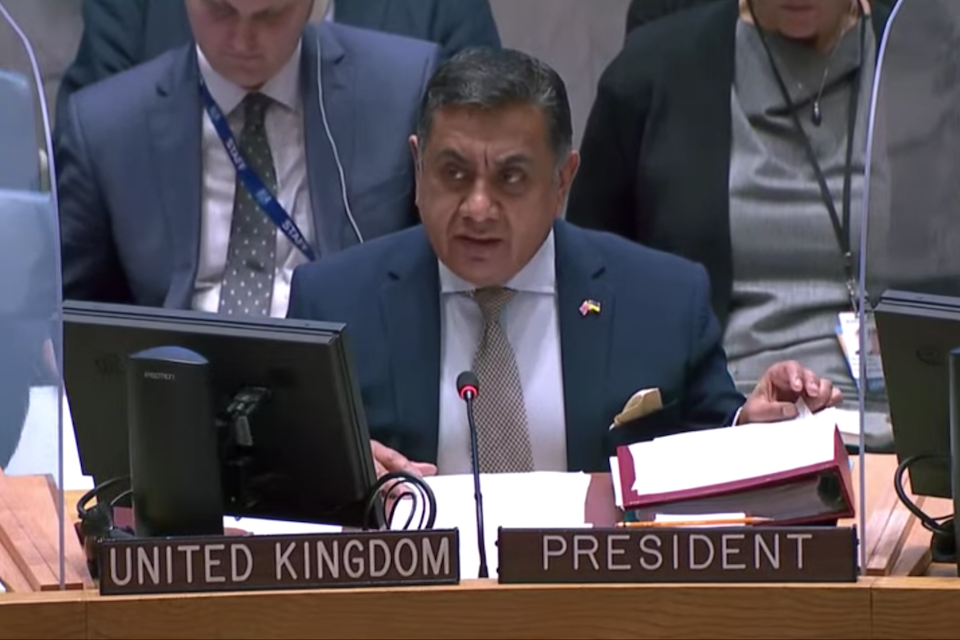Russia’s illegal war on the women and children of Ukraine: UK statement to the UN Security Council
Statement by Lord Tariq Ahmad of Wimbledon at the UN Security Council meeting on Ukraine

May I begin first of all in joining others in thanking the insightful and expert and deeply thoughtful contributions of our briefers. My thanks go to Sima Bahous from UN Women, to Mr Manuel Fontaine from UNICEF, and of course, Ms Kateryna Cherepakha who gave us a direct insight of the situation, on the ground, in Ukraine.
And in doing so, it reminds me that the Geneva Conventions contain numerous provisions that afford special protections to women and girls, as civilians, in conflict zones.
Yet, what we see today with our own eyes, and as today’s detailed briefings testify, is harrowing evidence of how women and girls are suffering.
Mr Putin’s invading forces are absolutely oblivious to even the most basic tenet of the Geneva Conventions - the distinction, the absolutely essential distinction, between civilians and combatants.
Today, sadly, we’ve once again heard Russia trying to deflect from the facts, the reality on the ground — muddy the waters — by what can only be described as quite extraordinary statements, and even lies. Yet, what is true, what is fact, is that Russian attacks on civilians and residential areas have been truly barbaric.
Yet, what we’ve seen shine through this, as a real beacon, is the Ukrainian people themselves. Ukrainian women have demonstrated incredible fortitude, and demonstrated the real resilience of the Ukrainian people.
Indeed, that was reflected in the engagement our own Prime Minister had in Ukraine recently. And, I myself — as we heard from the representatives of UNICEF, from UN Women and, indeed, the Representative of the United States — I’ve also had the opportunity, and I’m pleased we’re joined by Poland, when I visited Poland, I saw the strength and support of the Polish people. The incredible welcome being given to fleeing refugees. But also the resilience of Ukrainian women, predominantly women, as we’ve heard from many statements today, who are crossing the border. They’re being forced across the border because they want to protect their children who are accompanying them.
We’ve also met and seen female Members of Parliament who have resorted, because they can’t sit as Parliamentary Members, to take up firearms to defend themselves, to defend their people.
We’ve seen incredible courage from civic leaders refusing to leave their communities.
To the countless, and absolutely incredible, untold stories of heroism across Ukraine, as women have stood up to Russian forces — many armed with little more than patriotism, their own sense of courage and resilience, and a fierce sense of injustice.
Emerging reports paint a deeply disturbing picture, including alleged rapes and sexual violence within Ukraine’s borders.
The violence and exploitation does not end there – beyond the borders, displaced Ukrainian women and girls, as we’ve heard again today, face heightened risks of trafficking, a point made by UNICEF, and also sexual exploitation by criminal gangs.
The mounting evidence of war crimes in Ukraine compels us, surely, as the international community, to come together to stand and do more and stand with Ukraine — and stand with those who have faced such unspeakable violence.
The vote recently to suspend the Russian Federation from the Human Rights Council was proof of our collective will to do just that.
We must now work ceaselessly to investigate these crimes, and to hold Mr Putin, Russia and the forces of Russia to account.
And that is why the United Kingdom has worked closely with partners to refer this illegal invasion to the International Criminal Court, to establish a Commission of Inquiry through the Human Rights Council, and to establish an OSCE Mission of Experts.
Ukraine’s women, like many women around the world, as they continue to do today, helped build that open, democratic, free Ukraine — a society that for some reason, Mr Putin fears. And Ukrainian women’s participation at all levels, as we heard today from colleagues from Ireland and Kenya, amongst others, will be central if we are to build a sustainable and lasting peace.
And any peace settlement must also reflect the disproportionate impact of this conflict, this war, on the girls and women of Ukraine.
In conclusion, today’s UN Security Council discussion and meeting is a rallying call to us all, the international community, to recognise the impact of this illegal war. The impact of this illegal war on the very basis and foundations of international law. On the very basis and attack — on the very foundations on which this institution, the United Nations, is based. The actual Charter of the United Nations itself. And, it is an illegal war on the women and children of Ukraine — and ultimately we must come together, and act together, to hold Russia to account for these crimes.
I now resume my function as President of the Council.